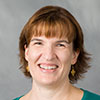This article is more than 5 years old.
I started my Saturday at a small Focus Group breakfast put on by ProQuest. I had asked a few questions at the ProQuest booth on Friday and was invited to this breakfast which was to talk to librarians about upcoming interface changes in ProQuest. A lot of what I saw I can’t talk about (nondisclosure and all that) but a few things stuck with me from the experience. First, ProQuest is talking to librarians at the VERY early stages of the process and plans to continue to talk to us throughout the process of designing the new interface. Second, they REALLY seemed to want honest feedback and weren’t in the least bit defensive or protective of their product. They came off seeming as if they really want to create the most usable and useful interface they can. Finally, it got me really excited about the direction they are going with their products. I’m hoping to have ZSR among the test groups they will have going this summer and will pass along more information about that if it arises. I had never been part of this kind of focus group and it was a really great experience for me to see databases from the design and usability angle.
Next it was on to the discussion of two paper presentations. The first was of a paper written by San Diego State University about a survey they did of their student assistants trying to gage how important both the academic and non-academic purposes of the library were in how integrated the students felt to the school. It was an interesting study that came of the intersection of the retention, success and persistence literature in higher education. It was rewarding to see what an important role the library does seem to play in the success of our students not just because we provide them with academic tools to conduct their research but also because we provide them with jobs, understanding and a place to come and feel safe. The second of the two paper presentations was done by UNC and USC (South Carolina) and looked at the academic library workforce. It was a workforce study (one of the only ones that have been done on librarians, apparently) and surveyed thousands of librarians that had graduated from the library programs in North Carolina (I vaguely remember filling out the survey – I’m sure some of you did, too). It confirmed some of what we know (lots of librarians will reach retirement age in the next 10 years) and also some things that were new, about how people find librarianship and why they leave.
Then after a lovely lunch, Susan, Mary Beth and I walked up to the Seattle Public Library. As a huge lover of architecture, I found the building fascinating. As a lover of libraries, I found it less than appealing as a place I personally would want to hang out in for very long. As a lover of logical design, I found it a nightmare. Truly a place where you need a map and an outstanding visual and perceptual sense to find your way around in. But it was full of people in the coffee shop, checking out things, waiting for tax help, working on computers and more.
Then it was back to the Convention Center to sit in on the beginning of Lauren’s panel presentation and then to hop over to see Lynn present her paper. I had missed her dry run at ZSR so it was great to see. I have a sneaking suspicion that if this study was done now with our renovations and our Starbucks that our students would be even more on the side of library as place.
Next was my own Cyber Zed Shed presentation on Google Docs. Most in the audience had used them, some had not. I hope my presentation gave them some new ideas for their use and the confidence to try it if they hadn’t. The response seemed positive, despite a bit of technical difficulties. I’ve done many presentations where the loss of an Internet connection would have been non-consequential but when your presentation topic is Google Docs, I would have had to do some interpretive dance to make it a success. As it turns out, I didn’t have to dance at all (to everyone’s great relief).
The day ended with a wonderful dinner at Wild Ginger and then the all-conference reception at the Expeience Music Project and Science Fiction Museum. Another architectural treasure, desined by Frank O. Gehry – it marked my first visit to one of his buildings. It totally worked for the purposes of these two collections and it was a nice evening all around.

1 Comment on ‘Saturday a ACRL – Roz’s Final Post’
Hey Roz, it looks like you had an audience member who was really excited about your presentation: http://www.learningtimes.net/acrlconference/2009/applying-what-ive-learned-at-acrl/ 🙂